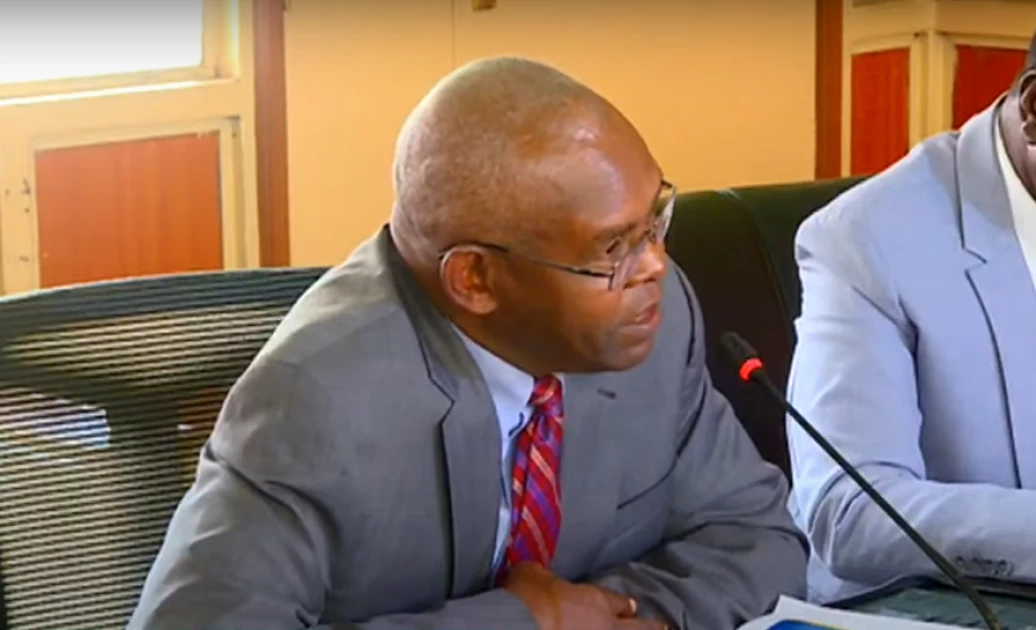CBK Governor Kamau Thugge at pains to explain performance of Kenya shilling


Audio By Vocalize
Central Bank of Kenya (CBK)
Governor Dr. Kamau Thugge was at pains to explain the performance of the Kenya
shilling against other currencies when he faced the Public Debt and
Privatisation Committee of the National Assembly.
Members sought to know what the
government was doing to stabilise the currency after the CBK Governor revealed
that in the past four months, Kenya's foreign debt had risen by over Ksh.382
billion; a figure expected to rise further if the shilling dwindles.
Committee Vice Chair Makali Mulu said:
“The issue of the exchange rate is actually a major concern for this country
and I think you need to come out more strongly and advice on what needs to be
done because these are issues under your domain.”
Wajir East MP Aden Daud posed: “Is
it a good policy for us to allow the market forces to dictate the value of the
shilling in the short term, or what is the cost benefit analysis of us trying
to prop up the shilling instead of the market forces vis a vis the debt burden?”
Thugge responded; “What we are
doing to address is fiscal consolidation, we have engaged investors, we are engaging
development partners with the expectations of inflows, we are doing something
about it…”
The committee members were
alarmed by a further admission that currency appreciation was resulting in a
rise in the debt stock, meaning already heavily taxed taxpayers would dig
deeper to keep the economy running.
“In four months the external debt
and debt service is estimated to have increased by Ksh.382.6 billion in terms
of external debt, and in terms of debt service payments an additional Ksh.6.9
billion,” he said.
Although the CBK Governor outlined
short term measures to help stabilise the shilling, it seemed the status quo
would remain for a while.
“The proximate cause of this
depreciation is the high interest rate in the United State…when the US started
to fight inflation, it was very aggressive, the inflation was at 9.1% last year,
the federal reserve bank has a rate of 2% and they wanted to reduce to the 2%
and they raised the federal reserve rates, the impact was the dollars was
sucked in into the US,” he stated.
However, the committee was still
unconvinced that the government was doing enough in comparison to the East
African Community neighbours.
MP Daud posed; “I wonder why the
Ugandan shilling has appreciated against the Kenya shillings and why the
Tanzanian shilling has appreciated against the Kenya shilling…does that mean
its only us affected by the higher interest rates in the US and the regional
markets?”
Thugge noted; “If you look at our
exports to the GDP ratio, its much lower than Uganda and Tanzania, which means
relative to their economy they get more foreign exchange into their economy. Secondly,
we are doing great in tourism than Uganda and Tanzania.”
The CBK boss said a further drop
in Kenya's tourism fortunes was also to blame for the reduction in foreign
exchange.
“This year I think we were
projecting tourism seats of roughly USD 1.2 billion…Uganda was at USD 1.1
billion…slightly lower than us…and Tanzania was in the range of USD 2.6
billion. If you take those figures relative to the size of the economy, you can
see we are well behind the two nations in terms of even tourism receipts, which
come as foreign exchange and help stabilise the dollar,” said Thugge.
The matter got bleaker as Thugge
put up a case for what is the state of the economy vis a vis her neighbours.
“This year we are projecting something
on the order of USD 775 million, if you go to Uganda they’re expecting
something on the order of USD 2.5 billion…that is almost three and a half times
what we are getting…of course they have the oil industry and a lot of FDIs
going there hence foreign exchange going to their system…again, in Tanzania, they’re
getting USD 1.6 billon in FDI, so they are factors explaining the strengthening
of their shilling, it started in 2019, the shilling has 27 percent,” he said.
The Central Bank Governor said the
government, in order to further fund its activities, is targeting to borrow Ksh.449.2
billion from the domestic market while at the same time mobilising external
funding from multilateral institutions, development partners and regional banks
as the African Development Bank for cheaper loans and grants.
“When we do get that additional external
financing, what happens is that there is a reduction in the domestic borrowing,
particularly since now it is quite high…the interest is quite high…we hope to
substitute domestic borrowing,” said Thugge.
The Controller of Budget, who
also appeared before the committee, revealed that invoices had shown that
public debt repayment accounted the biggest chunk of Kenya's expenditure at
over 89.3 percent.
The public debt committee intends
to conduct a special audit to ascertain Kenya’s financial soundness.


Leave a Comment